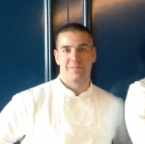
Why did you choose your stage location?
Cultural exchange and the dynamic state of New York City were the primary reasons for my location selection. New York City is the epicenter for food, fostering consciousness on how others approach the profession, ideas, and innovation. The applicant pool creates a saturation of talent challenging the individual to distinguish oneself. I chose this location to take myself out of my comfort zone, test my merit, and see how I measure up to Per Se. Presently working within the Thomas Keller Restaurant Group (TKRG), I knew transferring to another restaurant within the same company meant it would have similar operating procedures and systems, therefore allowing me to focus on the details of the experience. The project in which I applied for was to focus on the fabrication of meat and fish and to provide an opportunity to learn techniques and gain knowledge of products.
What struck you as the most important aspect of your stage?
Their standards were high and their expectations were higher, and so it was a great challenge. Relationships are an integral part, building trust with each colleague by sharing experiences and being of service to everyone. Even the smallest of tasks completed for a colleague led to future opportunities because of the trust built. I primarily collaborated with the commis team and the chefs de partie, under direction of the sous chefs. All the members of the Per Se team provided great instruction and demonstration.
What did you work on?
The majority of my time at Per Se was not spent on the project that I applied for. This was not a detriment to my experience as I found other opportunities to broaden my skill and knowledge. Mainly doing extern work, I picked herbs for the line, which were used for garnishes daily. This gave me the opportunity to speak with the chefs de partie and gain some of their insights. I also payed great attention to Per Se’s operating systems and procedures.
What did you learn?
Affirmation is important to a young culinarian, to grow their repertoire of skills and ideas. Collaboration in the kitchen provides an uncanny comradeship and willingness to learn. Menu meetings are advantageous, serving as a think-tank to create the menu for the following day. Expansion of knowledge and technique, just by listening alone, accelerates career growth for a young culinarian.
How did this stage experience influence you as a chef?
The impression left from Per Se inspired me to reach further in my community, profession, and beyond. To pay it forward is my personal reward. It was the opportunity to take learned skills back to my restaurant group, and to be a greater contributor, teacher, and mentor. The contrast between service and hospitality is how you make someone feel. My dinner at Per Se provided valuable insight how into we should approach every day, every moment. Hospitality is the nature of making one feel welcomed, to help them on their own personal journey. The next great chef must make use of hospitality as the cornerstone for the growing respect and reach of our profession.
In conclusion, what I draw from this project is the importance of relationships within our field. The founders of ment’or BKB are exactly that to several generations of chefs--mentors. The bond between the mentor and the mentee is significant if properly and mutually invested. With extensive time, the relationship fosters exchange of knowledge. That is not all. We chefs, tend to be emotional, very human. As professional as the kitchen may be, it cannot trump the emotion of one cooking.